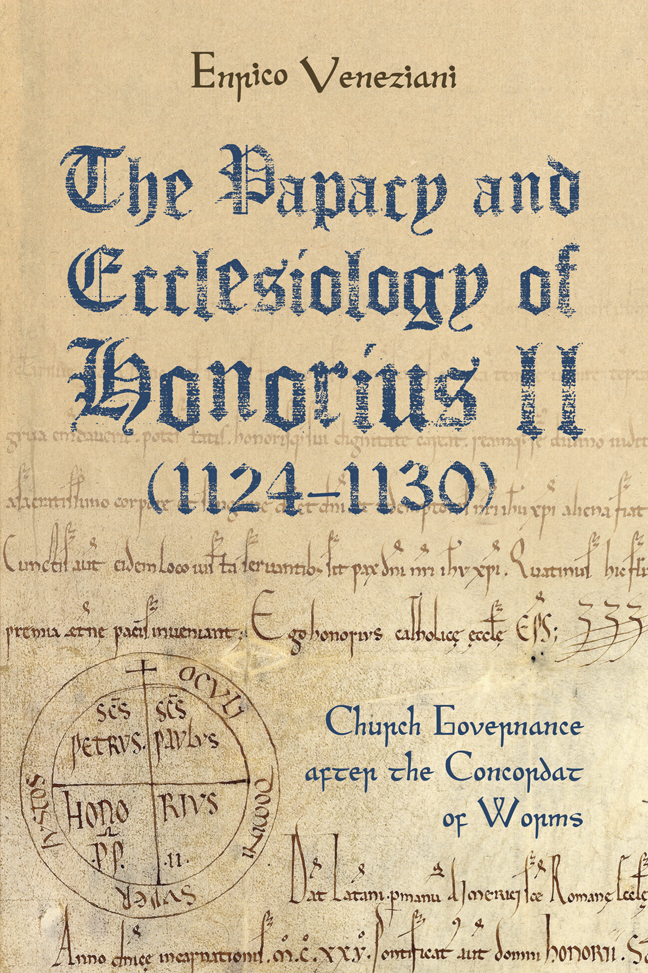 The Papacy and Ecclesiology of Honorius II (1124-1130)
The Papacy and Ecclesiology of Honorius II (1124-1130) Book contents
- Frontmatter
- Dedication
- Contents
- List of Illustrations
- Acknowledgements
- List of Abbreviations
- Introduction
- 1 Honorius II and Roman primacy: continuities and innovations
- 2 The instruments used to assert Roman primacy
- 3 Honorius's deafening silences: his relations with lay powers
- 4 Ecclesiology at work: a case study of Montecassino
- Conclusion
- Appendix: A preliminary calendar of the letters of Honorius II
- Bibliography
- Index
- Studies in the History of Medieval Religion
Conclusion
Published online by Cambridge University Press: 09 January 2024
- Frontmatter
- Dedication
- Contents
- List of Illustrations
- Acknowledgements
- List of Abbreviations
- Introduction
- 1 Honorius II and Roman primacy: continuities and innovations
- 2 The instruments used to assert Roman primacy
- 3 Honorius's deafening silences: his relations with lay powers
- 4 Ecclesiology at work: a case study of Montecassino
- Conclusion
- Appendix: A preliminary calendar of the letters of Honorius II
- Bibliography
- Index
- Studies in the History of Medieval Religion
Summary
This book has analysed Honorius II's papacy from an ecclesiological point of view – that is, Honorius's view of the Church and of the world. The examination of the chancery's extant letters, the context in which they were produced, and their aims have proved that the image of a transitional and colourless pontificate is not appropriate. The historiography has all too frequently overlooked Honorius; perhaps because of the brevity of his papacy, historians have focused on his immediate predecessors and successors. The study of this pontificate as a preamble to the double election of 1130 does not do justice to its importance. It suggests the idea that this pope deserves attention only for the links with what happened later. In contrast, my study has shown that Honorius's pontificate was an important one, during which significant steps were taken in the government of the whole Church. His pontificate was multi-faceted, revealing significant complexity but also some ambiguities that have never been pointed out in previous work.
The main image of Honorius is that of a cautious innovator. During his pontificate, claims were made in different areas – albeit not at the level of the greatest innovators – and always based on the context for which they were produced. The novelties can be divided into two categories, reflected in the division of the chapters of this book. The first group includes changes at a theoretical level, particularly in the assertion of Roman primacy. As the first chapter demonstrated, although there are no abstract letter-manifestos, Honorius's innovations were rooted in the practical reasons for which the epistles were sent, as tools for governing the Church. The papal chancery played a decisive role in the development of new claims – such as the focus on maternal images, the almost exclusive use of utilitas, and the possible assertion that one should obey Peter to save his or her soul – proving itself to be creative, ready to interpret what was needed and convey the different nuances of meaning intended by the pope. Clear evidence for this lies in the fact that most of the arengae appearing in Honorius's letters were first introduced during this papacy. Thus, they were thought out and produced each time to meet a specific need. There was a synergy between Honorius and his chancery, a joint action in creating the ecclesiology of this pontificate and adapting it to different situations.
- Type
- Chapter
- Information
- The Papacy and Ecclesiology of Honorius II (1124-1130)Church Governance after the Concordat of Worms, pp. 186 - 189Publisher: Boydell & BrewerPrint publication year: 2023


